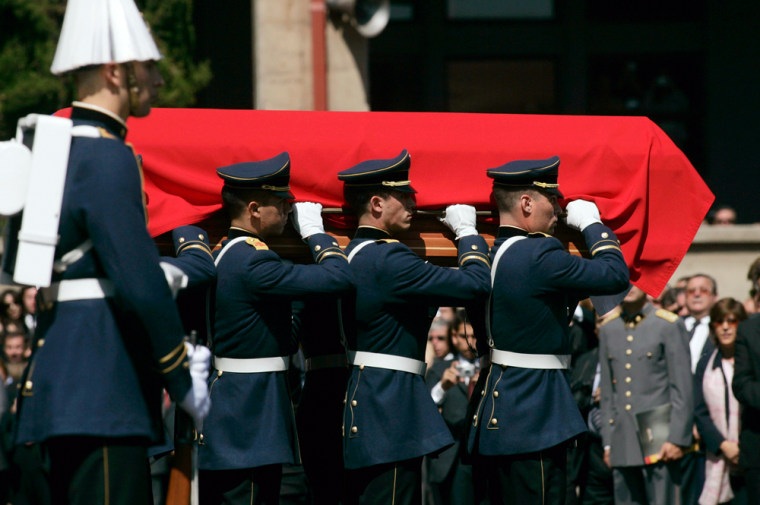Mourners at the funeral of Gen. Augusto Pinochet on Tuesday booed the defense minister whose government denied him a state ceremony, exposing the deep divisions in Chile over the former dictator’s legacy.
The funeral service was held after nearly 60,000 mourners, many in tears, filed past Pinochet’s glass-covered casket throughout Monday and early Tuesday at the Santiago Military Academy.
Defense Minister Vivianne Blanlot was noisily booed as she arrived as the government’s only representative at the military funeral for the general who supporters say saved Chile from communism by toppling an elected Marxist president and presiding over a hard-line government that killed thousands of foes.
“Go away, go away!” chanted many of the mourners, angered that the government of President Michele Bachelet — a Socialist who herself suffered imprisonment and exile under Pinochet’s regime — denied him a state funeral.
Blanlot remained standing beside military commanders. Pinochet’s younger daughter, Jacqueline, eased tensions by shaking Blanlot’s hand at the moment of exchanging peace wishes in the Roman Catholic Mass.
Church leaders called for Chileans to take Pinochet’s passing as an opportunity for national reconciliation.
This is a time “to pray for the soul of Gen. Pinochet, but also for the soul of Chile,” said Santiago Archbishop Cardinal Francisco Javier Errazuriz.
The army chief, Gen. Oscar Izurieta, asked Chileans “to let history make a balanced and fair judgment” of the man who toppled elected Marxist President Salvador Allende in 1973 and ruled Chile with a firm hand in the years that followed.
Army chief praises Pinochet
Izurieta told mourners that Pinochet staged the coup when Chile was living in “an extremely serious institutional crisis” under Allende and “because he was convinced that there was no other possible way out of it.”
“Gen. Pinochet was a soldier who loved his fatherland very much,” Izurieta said.
After the Mass and solemn military honors, Pinochet’s casket was slowly carried on a gun carriage to a waiting helicopter for a flight to an undisclosed cemetery outside of Santiago for cremation.
Across town, meanwhile, more than 3,000 people gathered to pay tribute to Allende, who committed suicide rather than surrender during the 1973 coup. Many carried photos of Allende or of relatives killed under Pinochet.
Chileans stood in line for hours to view Pinochet’s body, at times singing the national anthem in praise of the general.
The ceremonies that followed Pinochet’s death at 91 on Sunday exposed the split in society about the legacy of the man whose 1973-90 regime killed, tortured and imprisoned its enemies while forcing thousands into exile.
“This man rescued us from anarchy,” said one mourner, 76-year-old Alicia Mejia.
According to an official report, 3,197 people were killed for political reasons in the 17 years after Pinochet overthrew Allende in the Sept. 11, 1973, coup. More than 30,000 were tortured, many more illegally imprisoned and thousands were forced into exile.
Scattered fights broke out after Pinochet’s death Sunday between his supporters and jubilant Chileans who took to the streets to celebrate.
Monday was mostly calm, but minor clashes broke out at dusk in Santiago when police blocked a march by relatives of victims of the Pinochet regime trying to reach the government house. Reporters saw about 10 marchers detained, among them Lorena Pizarro, president of an association representing missing dissidents.
President: ‘Chile cannot forget’
Bachelet relegated the former army commander to his military past by ordering flags flown at half-staff only at military barracks, and sending her defense minister to the ceremony in her stead.
“Chile cannot forget,” Bachelet said in her first public comments about Pinochet’s death. “Only then will we have a constructive vision of our future, guaranteeing respect for the fundamental rights of all Chileans.”
Like tens of thousands of other Chileans, Bachelet was herself a victim of the Pinochet security state. Her father died after being tortured by Pinochet’s forces. She and her mother were jailed, mistreated and forced into exile.
“Pinochet is not a figure who encourages national unity,” said Interior Minister Belisario Velasco. History will view him as “a classic right-wing dictator who gravely violated human rights and who enriched himself — that’s the pattern of right-wing dictators in Latin America.”
The general’s followers called the government’s stance denying Pinochet a state funeral mean-spirited.
“Pinochet was a real president, not what we have now,” said retiree Jose Erazo, after viewing the open coffin.
Sergio Melnick, a minister under Pinochet, said “the government has lost a chance to show some greatness.”
Pinochet’s family, however, said it did not want anybody from the current socialist government to attend his funeral.
“I do not want any hypocritical acts,” said his younger son, Marco Antonio. “My father has not been forgotten and is a man who is loved,” he added, referring to the thousands filing by his coffin Monday.
Corruption controversy
But Pinochet’s fervent supporters represent a dwindling minority. Many who endorsed his firm hand against communism turned against him after learning that his family allegedly spirited $28 million into foreign bank accounts.
His death put an end to hundreds of criminal complaints over human rights violations.
His wife, Lucia Hiriart, and four of his five children still face charges of tax evasion and using false passports to manage the family’s overseas fortune, and Pinochet’s colleagues still may be held accountable for human rights abuses under his dictatorship.
